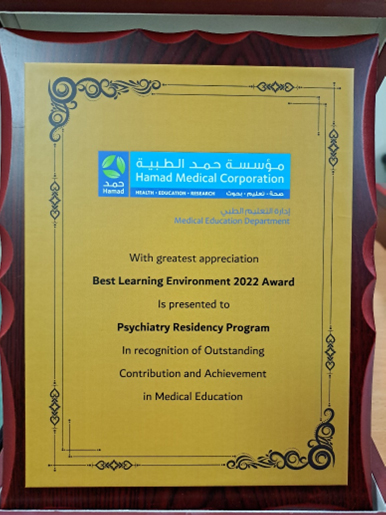Overview
The Psychiatry Residency Training Program at Hamad Medical Corporation (HMC) is a comprehensive, 4-year program accredited by the Accreditation Council for Graduate Medical Education International (ACGME-i). As one of the first programs at HMC to receive this prestigious accreditation, our curriculum is designed to provide a balanced and rigorous training experience in psychiatry, blending theoretical knowledge with clinical practice. Residents are supported by experienced faculty members and mentors, gaining expertise across various subspecialties, including general adult, child and adolescent, geriatric, consultation-liaison, perinatal, learning disability, addiction and forensic psychiatry. Our program emphasizes a strong foundation in both psychotherapeutic and pharmacological treatment, preparing our residents to meet international standards and become leaders in the field of mental health.
Psychiatry Residency Program Handbook
A 33-page pdf file created by our graduated trainees and provides a comprehensive guide about our Program.
https://drive.google.com/file/d/1teuiUlCERBqG3UgxAecRVYPd3S7MqNhx/view?usp=sharing
Rotation Outline
- Mandatory Rotations: In your first three years, you are required to complete placements in inpatient, outpatient, community, consultation-liaison, forensic, child and adolescent, geriatric and addiction psychiatry. The learning disability rotation is reserved for PGY4 level. Other training includes external placements in internal medicine, emergency medicine, family medicine, and neurology (first year). Completion of these mandatory rotations is necessary for your promotion to your next year.
- Elective Rotations: residents in their third and fourth year can undergo elective
placements in the aforementioned subspecialities, in addition to a research
- A master plan detailing resident rotation is drafted and shared with residents regularly by the chief resident.
Educational Activities
- Academic lectures: provided weekly (Tuesdays) from 11AM to 2:45PM. Lectures include case discussions presented by PGY1-2 and journal club presentations by PGY3-4. The curriculum caters to each residency year with distinct topics covering psychopathology, psychology, neuropsychiatry, pharmacology, research and ethics. (Refer to the Handbook section for detailed outline regarding the teaching curriculum)
- Problem-based discussions: Daily (Sun-Wed) at the Morning Report Meeting (7:30AM-8AM). Challenging cases are discussed on a volunteer-basis to solve open-ended clinical problems in regards to management, diagnostic, and ethical or legal issues.
- Psychotherapy curriculum: Our 4-year program provides a structured progression through introductory and theoretical concepts, along with practical applications in both cognitive-behavioral and psychodynamic therapy, delivered by experienced psychotherapy mentors. In PGY-1 and PGY-2, residents are introduced to Balint groups, while in PGY-3 and PGY-4, they receive supervised training in both cognitive-behavioral therapy (CBT) and psychodynamic therapy.
- HMC’s Medical Education department: Offers workshops on communication skills, professionalism, residents as teachers’ seminars and other materials. Residents are notified of expected courses attendance and completion through the program coordinator.
Exams
The program conducts a yearly assessment of medical knowledge with the Psychiatry Resident In-Training Examination (PRITE). The exam is delivered by the American College of Psychiatrists. It is an MCQ paper-based exam that is mandatory for all residents.
Two board certification exams are available, the Qatar and Arab Boards:
Arab Board Exam: Mandatory exam delivered by the Arab Board of Health Specializations. The exam is divided into two parts.
- Part 1: Written exam. Should be completed during the second year of Residency Training.
- Part 2: Written plus OSCE exam. Part 2 exam is completed after the end of residency training.
Qatari Board Exam: Mandatory exam delivered by the Qatari Board of Medical Specialities (QBMS). The exam is divided into two parts.
- Part 1: Written exam. Should be completed during the second year of residency training.
- Part 2: Written plus OSCE exam. Part 2 exam is completed after the end of residency training.
Awards
Our Program received the “Best Learning Environment Award’ during the Excellence in Medical Education Award Ceremony held on March 14, 2023.

